Kenneth L. Gentry Jr.'s Blog, page 98
June 14, 2016
CHURCH AS KINGDOM NATION
 PMT 2016-042 by Don Strickland
PMT 2016-042 by Don Strickland
Acts 17:26 And he made from one man every nation of mankind to live on all the face of the earth, having determined allotted periods and the boundaries of their dwelling place,
Jeremiah 31:33 “But this is the covenant which I will make with the house of Israel after those days,” declares the LORD, “I will put My law within them, and on their heart I will write it; and I will be their God, and they shall be My people.
Psalm 74:2 Remember your congregation, which you have purchased of old, which you have redeemed to be the tribe of your heritage!
Ephesians 1:5 He predestined us for adoption as sons through Jesus Christ, according to the purpose of his will.
Every nation (ethnos, from which we get our word “ethnicity”) comes from God. As the word implies, nation denotes a common people. Thus, a nation’s origin pertains to common ancestors, or ethnicity, with a common language, culture, and religion. Of course, that fact does not mean that those who are outside that common ethnic group cannot be a part of the nation. In the Old Testament, those outsiders wishing to join themselves to the nation of Israel, for instance, were allowed to do so (Isaiah 56.3). However, for those outsiders to join themselves to the nation, they had to assimilate themselves completely into the nation with its laws, customs, culture, and most importantly, religion (Num 15.13-16 and Ex 12.48-49). Remember Ruth’s words to Naomi, “Your people shall be my people, and your God my God” (Ruth 1.16).
Down But Not Out
by Wayne A. Mack
Wayne Mack brings biblical counsel to people suffering from worry or spiritual burnout—two major problems that knock us down. Other chapters treat “downers” such as self-pity, discontentment, discouragement, perplexity, and hopelessness.
See more study materials at: www.KennethGentry.com
Whereas nations generally form from one common people, empires form from a dominate nation forcibly controlling other nations. The resulting accumulation of disparate peoples with differing laws, languages, customs, cultures, and religions creates domestic instability within the empire’s borders. Enough instability, and the empire has four directions that it can go. It can become a tyranny, such as the Soviet Union and China became in the last century. It can fall, such as Rome did. It can downsize, like the Soviet Union or Great Britain did in the 20th Century. Or it may restructure, as the Austrian Empire did to share power in the 19th Century with its large restive Hungarian populace before itself was broken apart at the end of World War 1. Although downsizing is the best option since it can take an unstable empire back to the status of a stable nation, none of those choices are particularly beneficial, in the short term, for the dominate nation.
But what about God’s Kingdom? Since God takes people from “every nation and all tribes and peoples and tongues” (Rev 7.9) and places them into the Church, it would seem that a great deal of instability is built into the structure. And indeed, from the outside, it would certainly appear that way. The number of differing churches seems innumerable, and growing. Infighting, both legitimate and not, is common. The Church in the West speaks with many voices drowning each other out, as little agreement may be had even on major moral issues. This cultural irrelevancy makes it vulnerable to cultural pressures toward conformity, effectively silencing any message of repentance and forgiveness to a sinful society. And then, of course, we have racial, linguistic, cultural, and the many other issues that come with having members originating and spread across the whole world. But returning to a Church ruled by a Pope (tyranny) is not the answer either.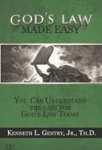
God’s Law Made Easy (by Ken Gentry)
Summary for the case for the continuing relevance of God’s Law.
See more study materials at: www.KennethGentry.com
The Church is not an empire, but a kingdom nation. Why do I say that? First, according to the covenant formula which God says repeatedly in the Bible, believers are His people (Ex 6.7; Jer 24.7, 30.22, 31.33; Hosea 2.23; Heb 8.10; and Rev 21.3). We are citizens of His Kingdom. But we are not just foreign immigrants who have entered this spiritual nation. We are actual members of His tribe. We have been adopted and have been made sons and heirs of the King. Read the verses above again. If you have been made a believer in Christ, you are a member of His family (Heb 2.10-11).
Therefore, spiritually speaking, you’ve got Christ Himself dwelling in and renewing you, and thus you are being changed into His likeness. The new birth, which Jesus spoke about to Nicodemas (John 3.1-8), started a process called sanctification. Think of this process as similar to the assimilation that immigrants enter upon when they declare an allegiance to a new nation or king. However, we are being assimilated internally, and the results of that assimilation are being seen in our thoughts, words, and deeds. There will be times when you feel like a foreigner to the Kingdom and out of step with the One who’s at work in you. But time and the Holy Spirit will be ever moving this internal change toward its completion on the day you enter His throne room and finally see Your Sovereign face to face.
Click on the following images for more information on these studies:

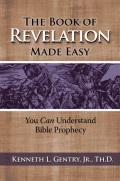
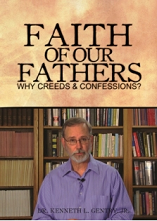








June 10, 2016
DECREED BORDERS
 PMT 2016-041 by Don Strickland
PMT 2016-041 by Don Strickland
Acts 17:24-26 “The God who made the world and everything in it, being Lord of heaven and earth, does not live in temples made by man, (25) nor is he served by human hands, as though he needed anything, since he himself gives to all mankind life and breath and everything. (26) And he made from one man every nation of mankind to live on all the face of the earth, having determined allotted periods and the boundaries of their dwelling place.”
Recently, Secretary of State John Kerry gave a commencement speech in which he spoke approvingly of a “borderless world.” Almost a week later, Senator Jeff Sessions (R-Alabama) wrote an opinion piece for USA Today in which he stated that the coming presidential election will be a choice between nationalism and globalism. Will we remain a distinct nation, or lose our identity in the sea of the global community? Open borders, or nations without borders, is being pushed, and has been for years, throughout the countries comprising Western civilization – that is, those countries populated by the people native to Europe. Even otherwise theologically conservative Christian pastors have argued from a compassionate and/or evangelistic framework to justify the invasion crossing Europe’s and America’s borders. But what exactly does the Bible teach about national borders?
In the above passage, Paul is speaking to a formal forum of philosophers in Athens, Greece. Since these men were not Jews and thus may not have been familiar with the Old Testament, Paul has to start with the basics in order to build a foundation from which to present the Gospel. Thus, he starts with God as the Sovereign, Omnipotent Creator. For our purposes here, verse 26 is the key. Much can be taken from this verse, such as the affirmation that all men descended from one man (literally “one blood”), but notice what Paul teaches about the nations of men.
Political Christianity (book)
(by Christian Citizen)
Christian principles appliend to practical political issues, including “lesser-of-evils” voting.
See more study materials at: www.KennethGentry.com
Every nation (ethnos, from which we get our word “ethnicity”) comes from God. Each nation has a set time (chronological) and boundaries (geographical) for its existence on the earth. Both are decreed by God. If a nation’s borders expand, God has decreed it. If a nation ceases to exist, God has decreed it.
But the primary point is that God has decreed boundaries. When the tribes of Israel settled in the land, God laid out specific boundaries for each tribe. Thus we see that boundaries are tied to the possession of private property. Certainly, the 8th Commandment assumes the concept of private property, but there are also specific commands concerning the moving of land boundary markers (Deut. 19.14), and condemnation for those who take land not their own (Micah 2.1-3). In commenting on Deuteronomy 19.14, the ancient Jewish historian, Josephus, considered this command a general prohibition. Therefore it was intended not only to protect private property, but also to preserve the boundaries of all nations.
If nations are to protect the people and their property, how are they to do so? They do so by enacting fair and just laws. But if there are no national borders, there is no sure jurisdiction to enforce such laws. Anarchy ensues. There have been many news reports over the past several months coming from the Southwestern states concerning the current lawlessness on the border there. Borders must be maintained for the rule of law to be maintained.
Borders must also be maintained to prevent tension between neighbors. The worse tension I have had with my neighbors was created because our property line was not adequately maintained when their house was built long before either of us moved into our respective homes. He contracted to have tree limbs cut, which were hanging over his house and driveway. The problem was that the trees were all on my property, and he neglected to ask my permission to have it done. I did eventually give my permission, but only after a few tense minutes elapsed with me confronting strangers as to why they were climbing in and cutting on my trees.
God Gave Wine
(by Ken Gentry)
A biblical defense of moderate alcohol consumption. Considers all key biblical passages and engages the leading objections.
See more study materials at: www.KennethGentry.com
In the same way, many times, nations go to war. World War 2 began after Adolf Hitler decided to invade Poland in order to take back German land that had been taken away at the end of World War 1. The war in Kuwait began when Sadaam Hussein decided to take territory (i.e. Kuwait) that he claimed was a part of Iraq. And so it goes.
But what of compassion and evangelism? Is it not compassionate to bring as many as possible here in order to remove them from danger? And does it not create a wonderful opportunity for growing the Kingdom through possible conversion of these many souls? The short answer for both is “no.”
One needs to return to the idea of what is a nation. It is both cheaper and far more compassionate to help those within their own country. To rip families away from their own laws, customs and culture, and send them to a foreign land with a foreign culture, language, laws, customs, etc. is a shock that few can comprehend. A people’s religion is the primary influence upon their culture and customs. Placing them into a land where the dominate religion is opposed creates an explosive mixture.
And as far as evangelism opportunities are concerned, the Bible commands us to go, not for them to come (geographically speaking). For the most part, the average American does not know the newcomers’ language, customs, or cultures, thus ministries are still left to sending trained specialists as missionaries. Also, it is not just to the people of a nation to bring in refugees which can endanger the nation’s own laws, customs, culture, and religion. Nor is it just to allow massive immigration, illegal or not, which saps the economic vitality of the host nation and fundamentally undermines its Christian heritage and culture.
We will be faced with voting for many important offices on the local, state, and national levels. When voting, many issues need to be considered and weighed. One’s views of the nation’s borders appears to be crucial at this point of our history. Please consider voting for those candidates who support strong borders for not only our nation, but for other nations as well. The principle works both ways. By making our borders strong, we retain our national integrity. By supporting other nation’s borders, we protect ourselves from coveting what other nations have.
Click on the following images for more information on these studies:


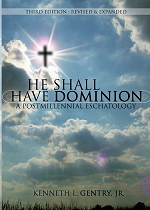








June 7, 2016
LONG REIGN IN SHORT BOOK?
 PMT 2016-040 by Kenneth L. Gentry, Jr.
PMT 2016-040 by Kenneth L. Gentry, Jr.
Although the vast majority of Revelation focuses on events that will occur “soon” (Rev 1:1, 3), the Revelation 20 section on the thousand years begins, but is not completed, in the first century. It projects itself into the distant future, allowing a glimpse of the end result of the events beginning in the apostolic era.
In Rev 20:4 John focuses on the martyred saints, who participate in Christ’s heavenly rule (Rev 20:4): “the souls of those who had been beheaded for their witness and those who had not worshiped the beast.” Given John’s time-frame concern (cf. Rev 1:3, 9), his focus is on the martyrs of the first-century era (Rev 6:9–11; 7:9, 13–15; 11:7–12; 12:5; 13:7, 15; 14:13; 16:6; 17:6; 18:20, 24). In fact, 20:4 is the answer to the plea of the martyrs in Rev 6:9–11, as we can see from the strong parallels between the passages:
Rev 20:4
And I saw the souls of those who had been beheaded because of the testimony of Jesus and because of the word of God.
Rev 6:9
I saw underneath the altar the souls of those who had been slain because of the word of God, and because of the testimony which they had main-tained.
In Revelation 20:1–3 John explicates the first phase of Christ’s triumph over Satan: he is spiritually bound, being restricted from successfully accomplishing his evil design in history. In Revelation 20:7–10 we witness the second and concluding phase of Christ’s triumph: Satan is personally punished, being tormented in the eternal flames of the lake of fire. John employs this two-fold pattern of spiritual/physical realities followed by initial/conclusive realities in the resurrection reference in Revelation 20, as well.
Keys to the Book of Revelation
(DVDs by Ken Gentry)
Provides the necessary keys for opening Revelation to a deeper and clearer understanding.
See more study materials at: www.KennethGentry.com
The “first resurrection” secures the participation of the martyred saints in Christ’s rule (Rev 20:4–6). The context suggests that this resurrection may not be literal. After all, we see a chain binding Satan and a key locking the abyss. As in the case of the two-fold triumph over Satan, this is the initial, spiritual victory-resurrection. That is, it refers to the spiritual resurrection of the martyrs who are born again by God’s grace and enter heaven to new life. After all, elsewhere Scripture speaks of salvation as a spiritual resurrection: “We know that we have passed from death to life, because we love the brethren. He who does not love his brother abides in death” (1Jn 3:14; cp. See also: Ro 6:8–11; Eph 2:6; Col 2:13–14). For dramatic purposes John ties this resurrection to the martyr’s vindication in AD 70.
Elsewhere John, Revelation’s author, speaks of a non-literal resurrection that occurs at the moment of salvation, much like Rev 20 associates a non-literal resurrection with the martyrs’ vindication in AD 70. He presents this in such a way that it serves as an advance indication of the final eschatological resurrection:
“Most assuredly, I say to you, he who hears My word and believes in Him who sent Me has everlasting life, and shall not come into judgment, but has passed from death into life. Most assuredly, I say to you, the hour is coming, and now is, when the dead will hear the voice of the Son of God; and those who hear will live. For as the Father has life in Himself, so He has granted the Son to have life in Himself, and has given Him authority to execute judgment also, because He is the Son of Man. Do not marvel at this; for the hour is coming in which all who are in the graves will hear His voice and come forth; those who have done good, to the resurrection of life, and those who have done evil, to the resurrection of condemnation.” (Jn 5:24–29)
John presents the martyrs’ vindication metaphorically as their being resurrected to enthronement, which does not require a physical resurrection. This non-literal enthronement should not surprise us in that earlier he more broadly states that he “has made us kings and priests to His God and Father, to Him be glory and dominion forever and ever” (Rev 1:6). After all, Christians are “overcomers” (cf. 1Jn 2:13–14; 4:4; 5:4–5) and sit with Christ in heavenly rule: “To him who overcomes I will grant to sit with Me on My throne, as I also overcame and sat down with My Father on His throne” (Rev 3:21). As Paul puts it, Christ “raised us up together, and made us sit together in the heavenly places in Christ Jesus” (Eph 2:6).
Book of Revelation Made Easy
(by Ken Gentry)
Helpful introduction to Revelation presenting keys for interpreting. Also provides studies of basic issues in Revelation’s story-line.|
See more study materials at: www.KennethGentry.com
The “rest of the dead” do not participate in this first century, spiritual resurrection. In fact, they “do not live again until the thousand years” is finished (Rev 20:5). For John’s purposes, these dead probably refer to “the rest,” who were killed in Revelation 19:21 — the associates of the beast (Nero) who is slain in the context of AD 70. In the future they will be physically resurrected (implied) in order to experience “the second death” (eternal torment in both body and soul, Mt 10:28), which occurs on Judgment Day (Rev 20:11–15).
Click on the following images for more information on these studies:
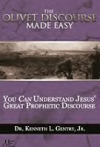

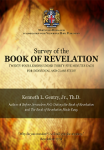








June 2, 2016
POSTMILLENNIAL PAUL
 PMT 2016-039 by Kenneth L. Gentry, Jr.
PMT 2016-039 by Kenneth L. Gentry, Jr.
Paul was a postmillennialist. We can know this by process of deduction. We know he was not a dispensationalist, because the dispensational system is so complicated that it took 1830 years to develop. Plus he never presents a Rapture chart in any of his known epistles (though admittedly he could have included one in either of his two lost Corinthians epistles). And we know he was not an amillennialist because he did not have a Dutch name.
But what exegetical evidence do we have for Paul’s postmillennialism? Romans 11 is one of the key texts demonstrating Paul’s historical optimism.
Paul writes in Rom 11:10–26:
I say then, they did not stumble so as to fall, did they? May it never be! But by their transgression salvation has come to the Gentiles, to make them jealous. Now if their transgression be riches for the world and their failure be riches for the Gentiles, how much more will their fulfillment be! But I am speaking to you who are Gentiles. Inasmuch then as I am an apostle of Gentiles, I magnify my ministry, if somehow I might move to jealousy my fellow countrymen and save some of them. For if their rejection be the reconciliation of the world, what will their acceptance be but life from the dead? And if the first piece of dough be holy, the lump is also; and if the root be holy, the branches are too. But if some of the branches were broken off, and you, being a wild olive, were grafted in among them and became partaker with them of the rich root of the olive tree, do not be arrogant toward the branches; but if you are arrogant, remember that it is not you who supports the root, but the root supports you. You will say then, “Branches were broken off so that I might be grafted in.” Quite right, they were broken off for their unbelief, but you stand by your faith. Do not be conceited, but fear; for if God did not spare the natural branches, neither will He spare you. Behold then the kindness and severity of God; to those who fell, severity, but to you, God’s kindness, if you continue in His kindness; otherwise you also will be cut off. And they also, if they do not continue in their unbelief, will be grafted in; for God is able to graft them in again. For if you were cut off from what is by nature a wild olive tree, and were grafted contrary to nature into a cultivated olive tree, how much more shall these who are the natural branches be grafted into their own olive tree? For I do not want you, brethren, to be uninformed of this mystery, lest you be wise in your own estimation, that a partial hardening has happened to Israel until the fulness of the Gentiles has come in; and thus all Israel will be saved; just as it is written, “The Deliverer will come from Zion, / He will remove ungodliness from Jacob.
Here Paul is dealing particularly with the question of ethnic Jews in redemptive history’s new covenant phase. But the way he handles the matter leads him to assert global optimism regarding Christianity’s future — almost in passing as he simply assumes the gospel’s global conquest. Let us note the setting of his argument.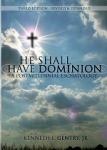
He Shall Have Dominion
(paperback by Kenneth Gentry)
A classic, thorough explanation and defense of postmillennialism (600+ pages). Complete with several chapters answering specific objections.
See more study materials at: www.KennethGentry.com
In Romans 8 and 9 he vigorously asserts God’s absolute sovereignty. But this causes a question to arise: What about the Jews? If God is sovereign, how can we explain their rejecting Christ and falling away from God’s favor? Are they not “His people” (Rom 11:1, 2)? Were they not the adopted sons who possessed the promises of God (Rom 9:4)? Romans 9–11 answers that important question.
Paul is clearly dealing with ethnic Jews when he raises the question for he writes: “I say then, God has not rejected His people, has He? May it never be! For I too am an Israelite, a descendant of Abraham, of the tribe of Benjamin” (Rom 11:1). He defines “His people” by referring to Israel’s ethnic tribes (Rom 11:1), by citing Elijah’s experience (Rom 11:2), and by distinguishing them from the Gentiles (Rom 11:11–13, 25).
As he engages the thorny issue, he asks two questions: Has God rejected his people (Rom 11:1)? And has Israel stumbled for the purpose of absolutely falling away (Rom 11:11)? In answering these questions in his context, he argues that God’s sovereignty does not fail because: (1) Even “at this present time there is a remnant according to the election of grace” (Rom 11:5; cp. 2–6) and God himself sovereignly hardens the rest (Rom 11:7–10). (2) God will bring the Jews back into God’s favor in the future and on an equal footing with the saved Gentiles (Rom 11:11–26). Thus, the current presence of a remnant shows his rejection is not total and the future hope of their fullness shows that his rejection is not final.
Millennial Orientations
The four basic millennial schools present distinctive approaches to Paul’s statement in Romans 11:25–26a: “For I do not want you, brethren, to be uninformed of this mystery, lest you be wise in your own estimation, that a partial hardening has happened to Israel until the fulness of the Gentiles has come in; and thus all Israel will be saved.”
The premillennialist and the dispensationalist see the statement that “all Israel will be saved” as promising a future national, geo-political restoration of Israel’s kingdom. Generally the amillennialist sees this as signifying that the Church fulfills Israel’s promises by becoming the true Israel. The postmillennialist sees here the promise of world conversion as finally including ethnic Israel herself.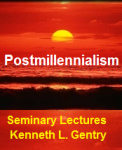
Postmillennial Lectures
(DVDs by Ken Gentry)
Formal seminary course developing and defending postmillennial eschatology.
See more study materials at: www.KennethGentry.com
The postmillennial approach best fits the flow of Paul’s argument, however. In the second phase of his argument proving that God’s sovereignty does not fail, he explains that Israel did not stumble at Christ for the purpose that (Gk., hina) they might utterly and finally fall away (Rom 11:11). In introducing the problem he vigorously rejects any such prospect: “May it never be!” for “God has not rejected His people whom He foreknew” (Rom 11:1, 2). He also rejects this possibility immediately after posing the question: “May it never be!” (Rom 11:11). Rather God’s purpose in Israel’s current condition is to bring in Gentile salvation, with the final result that this will spark widespread Jewish conversions: “salvation has come to the Gentiles, to make them jealous” (Rom 11:11).
Paul then states: “Now if their transgression be riches for the world and their failure be riches for the Gentiles, how much more will their fulfillment be!” (Rom 11:12). We must understand that since Israel’s loss is almost total (only a remnant remains, Rom 11:5), her “fulfillment [Gk., pleroma]” must be commensurate with her loss, which means it must be virtually total. Hence, postmillennialists believe in future, massive conversions among the Jews, not only due to our general theological expectations regarding worldwide salvation, but also due to this particular exegetical evidence.
Amillennial Objections
Amillennialists dismiss this view for two contextual reasons: (1) This salvation of Israel is a “mystery” (Rom 11:25), which presents an unexpected resolution to the Jewish problem — that is, that the Church becomes Israel so that God fulfills Israel’s promises through her. (2) Paul uses the phrase kai houtos (“and thus”), which means “in this manner,” “in this way.” This phrase, so they argue, does not refer to temporal sequence tracing the falling away of the Jews, then the conversion of the Gentiles, followed finally by Israel’s salvation. Rather it refers to the unexpected manner by which God fulfills his promise: by making the Gentile Church the fulfillment of Israel’s hope.
Postmillennialism can answer both objections. First, in that Paul emphasizes ethnic Israel in his opening question (Rom 11:1–2) and in that he plays Gentiles over against Israel (Rom 11:11–13, 25), the “mystery” involved is the remarkable, unanticipated method God uses: he plays Israel off the Gentiles. This involves the salvific wave motion of Israel falling away from God’s favor, Gentiles coming in, then Israel being drawn back in.
Second, regarding “and thus”: though it is true that it often lacks sequential emphasis, this is not always the case. For instance, in 1 Corinthians 11:28 Paul writes: “But let a man examine himself, and so [same Greek phrase] let him eat of the bread and drink of the cup.” Indeed, some major versions translate this usage temporally: “A man ought to examine himself before he eats of the bread and drinks of the cup” (NIV). “Examine yourselves, and only then eat of the bread and drink of the cup” (NRSV). Temporal sequence seems clear in other texts, as well (Acts 17:33; 20:11; 1 Cor 14:25). This presents no problem to the postmillennial interpretation.
Consequently, in Romans 11 Paul speaks of Christianity’s future glory: the Jewish failure will eventually bring “riches for the world” (Rom 11:12), resulting in “the reconciling of the world” (Rom 11:15), leading to “the fulness of the Gentiles” (Rom 11:25). All three references point to massive, worldwide conversions. All three underscore the postmillennial hope.









May 31, 2016
DO PRETERISM AND POSTMILLENNIALISM DIFFER?
 PMT 2015-038 by Kenneth L. Gentry, Jr.
PMT 2015-038 by Kenneth L. Gentry, Jr.
From time to time I receive a question regarding the difference between preterism and postmillennialism. Some folks are confused if they contradict or if they are speaking of the same thing. Let me briefly distinguish the two theological concepts.
Preterism
The word “preterist” is the transliteration of a Latin word that means “passed by.” The orthodox preterist sees certain passages as referring to the destruction of Jerusalem and the temple in AD 70, though many evangelicals understand these to be speaking of the second coming of Christ at the end of history.
The second coming and the AD 70 judgment of Christ on Jerusalem are often spoken of with similar language. This is because they are theologically related concepts. The AD 70 holocaust is a microcosmic picture of the final day of history when Christ returns in judgment. That is, AD 70 is small, historical picture or advanced sample of what the final judgment will be like.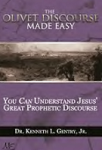
Olivet Discourse Made Easy (by Ken Gentry)
Verse-by-verse analysis of Christ’s teaching on Jerusalem’s destruction in Matt 24. Show the great tribulation is past, having occurred in AD 70.
See more study materials at: www.KennethGentry.com
Preterism has nothing necessarily to do with postmillennialism. There are preterist postmillennialists and there are historicist postmillennialists. Both are true forms of postmillennialism. There are also preterist amillennialists. Thus preterism does not commit one to any particular eschatological system.
Preterism is more of a hermeneutic tool than a theology. That is, it helps us understand certain passages without committing us to theological position.
Postmillennialism
Postmillennialism is a theological position on “the last things” that are to occur toward the end of history, an eschatological school of thought. Postmillennialism is an optimistic eschatological system that believes that Christ’s kingdom is currently present in history and will gradually win a dominant sway over men and nations as the gospel makes fuller progress in the world.
Postmillennialism holds to a single final coming of Christ (no separate rapture), a general resurrection of the saved and the lost simultaneously, and a general judgment of the saved and the lost in one setting.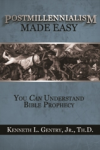
Postmillennialism Made Easy (by Ken Gentry)
Basic introduction to postmillennialism. Presents the essence of the postmillennial argument and answers the leading objections. And all in a succinct, introductory fashion.
See more study materials at: www.KennethGentry.com
Thus, postmillennialism looks for the growing influence of the gospel in history before the end comes. After a long time of dominance, Christ will return to resurrect and judge all men and end history while establishing the eternal, consummate order.
Conclusion
Thus, preterism and postmillennialism are altogether different concepts. Preterism is basically a hermeneutic, whereas postmillennialism is a theological system. They may occur simultaneously in one’s worldview, or they may be found in differing systems of thought.









May 27, 2016
COVENANT THEOLOGY = REPLACEMENT THEOLOGY?
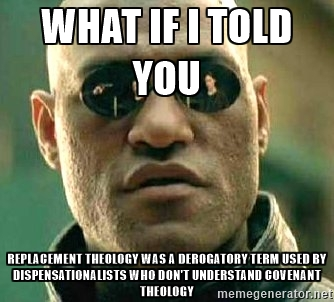 PMT 2016-037 by R. Scott Clark
PMT 2016-037 by R. Scott Clark
[Note: This is a helpful article by R. Scott Clark that responds to dispensational confusion regarding covenant theology.]
Recently I had a question asking whether “covenant theology” is so-called “replacement theology.” Those dispensational critics of Reformed covenant theology who accuse it of teaching that the New Covenant church has “replaced” Israel do not understand historic Reformed covenant theology. They are imputing to Reformed theology a way of thinking about redemptive history that has more in common with dispensationalism than it does with Reformed theology.
First, the very category of “replacement” is foreign to Reformed theology because it assumes a dispensational, Israeleo-centric way of thinking. It assumes that the temporary, national people was, in fact, intended to be the permanent arrangement. Such a way of thinking is contrary to the promise in Gen. 3:15. The promise was that there would be a Savior. The national people was only a means to that end, not an end in itself. According to Paul in Ephesians 2:11-22, in Christ the dividing wall has been destroyed. It cannot be rebuilt. The two peoples (Jews and Gentiles) have been made one in Christ. Among those who are united to Christ by grace alone, through faith alone, there is no Jew nor Gentile (Rom. 10:12; Gal. 3:28; Col. 3:11).
Israel in the Bible and History (9 mp3 lectures)
by Ken Gentry
The people of Israel are the people of God. But the modern church is divided over the nature, call and identity of Israel. This lecture series covers key issues for understanding the biblical concept of Israel.
See more study materials at: www.KennethGentry.com
At least some forms of dispensationalism have suggested that God intended the national covenant with Israel to be permanent. According to Reformed theology, the Mosaic covenant was never intended to be permanent. According to Galatians 3 (and chapter 4), the Mosaic covenant was a codicil to the Abrahamic covenant. A codicil is added to an existing document. It doesn’t replace the existing document. Dispensationalism reverses things. It makes the Abrahamic covenant a codicil to the Mosaic. Hebrews 3 says that Moses was a worker in Jesus’ house. Dispensationalism makes Jesus a worker in Moses’ house.
Second, with respect to salvation, Reformed covenant theology does not juxtapose Israel and the church. For Reformed theology, the church has always been the Israel of God and the Israel of God has always been the church. Reformed covenant theology distinguishes the old and new covenants (2 Cor. 3; Heb. 7-10). It recognizes that the church was temporarily administered through a typological, national people, but the church has existed since Adam, Noah, and Abraham; and it existed under Moses and David; and it exists under Christ.
To continue reading: http://heidelblog.net/2013/08/covenant-theology-is-not-replacement-theology/








May 24, 2016
BELIEVERS AT THE GREAT WHITE THRONE?
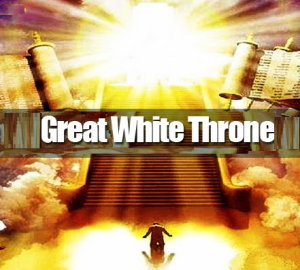 PMT 2016-036 by Kenneth L. Gentry, Jr.
PMT 2016-036 by Kenneth L. Gentry, Jr.
A reader writes
“As I anxiously await the publication of your full commentary on Revelation, I was wondering if you could give me your perspective of the Great White Throne Judgment. Growing up as a dispensationalist I was always taught that it was a judgment of only unbelievers. But then reading through several commentaries from a Reformed perspective, it sounds like it’s a general judgment of everyone (which makes sense, cf. Mt. 25:31ff).”
Gentry responds
Let’s briefly consider Rev 20:12, which is the verse in question.
And I saw the dead, the great and the small, standing before the throne (20:12a).
John’s primary focus here appears to be on the unrighteous dead, who will be thrown into the lake of fire (20:15). We have just seen the judgment of Satan and the destruction of Gog and Magog. Nevertheless, “final salvation is secondarily included” (G. K. Beale 1033). And this seems to be the case because:
(1) “The great and small” is an inclusive image, which John sometimes applies to believers (11:18; 13:16; 19:5, 18), though he can apply it to unbelievers alone (19:18).
Before Jerusalem Fell
(by Ken Gentry)
Doctoral dissertation defending a pre-AD 70 date for Revelation’s writing. Thoroughly covers internal evidence from Revelation, external evidence from history, and objections to the early date by scholars.
See more study materials at: www.KennethGentry.com
(2) The book of life is one of the books opened, and it only the names of believers (20:12, 15; cp. 3:5; 13:8; 17:8; 21:27; cf. Ex 32:32; Ps 69:28; Da 12:1; Lk 10:20; Php 4:3). After he mentions both “the books” and “the book of life,” we hear that “the dead were judged from the things which were written in the books, which seems to include “the book of life.”
(3) This fits the consistent NT witness of a general judgment of all men (Mt 13:26–30, 47, 50; 25:32–33; Jn 5:28–29; Ac 24:15).
Though John does not expressly mention the resurrection here, he seems to imply it. As Beale (1032) observes “standing before the throne” entails resurrection in 5:6, and 20:13 has the sea giving up the dead. This passage focuses more on the significance of that day for judgment (and with the emphasis on the unrighteous) than on the mechanics of that day by means of resurrection. Interestingly, Scripture frequently (though not invariably) reserves “resurrection” discussion for believers, as we see in Paul’s writings (1Co 15:20–23; 1Th 4:13–17).
And books were opened; and another book was opened, which is the book of life; and the dead were judged from the things which were written in the books, according to their deeds (20:12b).
Again as usual in Rev, the aorist passive (ēnoikchthēsan) suggests divine action in opening the books (Smalley 517): all human deeds are open to God (Ps 33:13; 139; Pr 15:3; Jer 16:17; Heb 4:13). This is not a picture of literal books (whether scrolls, hardbacks, or Kindle versions), but a metaphor representing “God’s unfailing memory” (Beale 1033). In this regard we must recognize that the glass sea in heaven is that through which God easily sees the earth. And we must understand that the four living creatures are full of eyes to see all of creation (4:6, 8).
Blessed Is He Who Reads: A Primer on the Book of Revelation
By Larry E. Ball
A basic survey of Revelation from the preterist perspective. It sees John as focusing on the destruction of Jerusalem and the temple in AD 70.
See more study materials at: www.KennethGentry.com
That the “books were opened” emphasizes two realities of the judgment: God’s righteousness and public disclosure.
(1) Regarding God’s righteousness: Men are not left to wonder why they are judged; their “deeds” are recorded in books that will be opened and they are judged on that basis (Ps 62:12; Pr 24:12; Ro 2:6-13; 14:12; 1Co 3:13; 2Co 5:10; Eph 6:8; Col 3:25; Rev 22:12). That there are “books” plural implies the detailed nature of the record and the great number of sins committed (cp. 18:5). “I say to you, that every careless word that men shall speak, they shall render account for it in the day of judgment. For by your words you shall be justified, and by your words you shall be condemned” (Mt 12:36-37//; cp. Mt 10:26).
(2) Regarding public disclosure: All deeds will be publically exposed, “for nothing is hidden, except to be revealed; nor has anything been secret, but that it should come to light (Mk 4:22//; Ro 2:16; 1Co 4:5). Chilton (533) well notes: “The point of the text is not, of course, ‘salvation by works.’ The point is, instead, damnation by works.”
That believers stand before God’s throne at the judgment shows that they too must give an account of their lives (cf., Mt 16:27; Ro 2:6–10; 14:10, 12; 1Co 3:12–15; 2Co 5:10; 1Pe 1:17). But in their case, the slain Lamb’s righteousness shields them from God’s wrath (as anticipated in 1:5). In 7:9–10, 14 we saw the righteous before God’s throne proclaiming salvation through the Lamb. Their victory is through “the blood of the Lamb” (12:11; cp. 13:8; 14:4; 15:3; 17:8). The book of life was written before the foundation of the world (13:8; 17:8), which shows the absolute sovereignty of God in salvation (Ac 13:48; Eph 1:4–5; Ro 9:10–23; 2Ti 1:9). Yet, the judgment of works results in differing degrees of punishment for unbelievers, as well as differing degrees of blessings for believers (Mt 25:20–23; Ro 14:12; 2Co 5:10; Eph 6:8).
Click on the following images for more information on these studies:

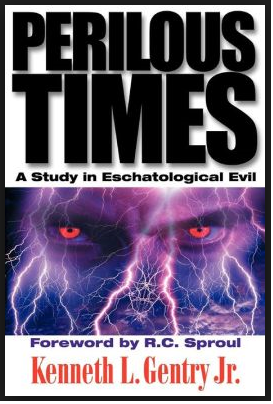
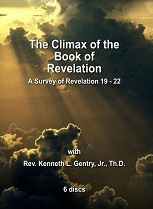








May 20, 2016
CHRISTIANITY: AUSTRALIA’S GREATEST SHAPER
PMT 2016-035 by Robert Ward
Should the influence of Christian values be consigned to the history books? This was the question posed to former Prime Minister John Howard by Eternity recently.
In a wide-ranging response, Howard stood firm on his credentials as a person of faith himself, while recognising that arguments today had to be made that appealed to the whole community, not just to those who shared a Christian worldview.
Identifying Judaeo-Christian values as the “greatest shaper, morally and ethically, of today’s Australia”, Howard argued that while we owe much to such institutions as the United Nations and documents like our constitution, we can trace much of what we value back to the teachings of Jesus. For instance, the appropriate separation of church and state, where he made it clear: “Render unto Caesar the things that are Caesar’s, and unto God the things that are God’s.”
“The notion,” Howard said, “that Christian influence and values should be consigned to history books is a nonsense. Australians should be aware that there are some who would drive Christian religion out of the public space. For instance, attempts made by some state governments, especially in Victoria, to make it almost impossible to have religious instruction in state schools -although technically allowed but made practically very difficult – is an offensive manifestation of an anti-religious streak in some sections of government around Australia, and it ought not be taken lightly.
Political Christianity (book)
(by Christian Citizen)
Christian principles appliend to practical political issues, including “lesser-of-evils” voting.
See more study materials at: www.KennethGentry.com
“Those who would preference Jingle Bells but limit Once in Royal David’s City at Christmas in schools, are doing a great disservice to the next generation,” said Howard.
When asked about the Safe Schools Coalition, Howard said his issue was not with programmes to counteract bullying but with the content of this programme in particular. He supported anti-bullying programmes, but he had looked closely at this material and his criticism was of the nature of the programme and the agenda being pushed. He said he was glad that the federal government was making some changes and, equally importantly, allowing parents a say in what their children were being exposed to.
He thought that a decision by the Victorian government to make the programme compulsory, irrespective of parental concerns, was excessive.
Howard commented that although he was a longstanding customer of a firm that was making public pronouncements on LGBTI issues, it had never asked him if he supported its position. Howard said that he did not believe it was the role of business to act in this manner.
As to the future, Howard suggested Christians should make arguments that would appeal to the whole community, not just those who would take their guidance from Christianity. For instance, the evidence supports his view on the current definition of marriage.
Postmillennialism Made Easy (by Ken Gentry)
Basic introduction to postmillennialism. Presents the essence of the postmillennial argument and answers the leading objections. And all in a succinct, introductory fashion.
See more study materials at: www.KennethGentry.com
“Children do best when they grow up in a stable, traditional married family, with a mother and a father present. Not every marriage works, of course, but it is the best model of stability for children,” said Howard. On this basis alone, he said, he would not be supporting a change in the definition of marriage.









May 17, 2016
CHRISTIANITY IN CHINA
 PMT 2016-034 by Carl Bunderson
PMT 2016-034 by Carl Bunderson
According to sociologist Rodney Stark, China’s intellectuals are increasingly convinced ‘Eastern religions don’t fit the modern world they’re engaged in and that they need to look to the West to find philosophies and religions.’
Christianity is spreading rapidly in China, and it could be because of how well the faith fits in with modern scientific technology.
According to renowned sociologist Rodney Stark, the number of Christians in China is growing at an impressive annual rate of 7%.
Stark and Xiuhua Wang authored the 2015 work A Star in the East: The Rise of Christianity in China. Stark views himself as a social historian and is co-director of the Institute for Studies of Religion at Baylor University.
He Shall Have Dominion
(paperback by Kenneth Gentry)
A classic, thorough explanation and defense of postmillennialism (600+ pages). Complete with several chapters answering specific objections.
See more study materials at: www.KennethGentry.com
Stark and Wang estimate that in 1980 there were 10 million Christians in the People’s Republic of China and that, in 2007, the figure was 60 million. These numbers yield an annual growth rate of 7% — which means that last year, there were nearly 100 million Christians in China.
They hold that this large increase in the number of Christians in China is driven by the conversion of the better educated, who are experiencing “cultural incongruity” between traditional Asian culture and industrial-technological modernity, which results in a spiritual deprivation, which Christianity is able to answer.
China’s intellectuals, Stark told CNA Aug. 14, “are very convinced they’ve got to turn West[ern] to understand the world they live in … and they’re convinced by my argument that Eastern religions don’t fit the modern world they’re engaged in and that they need to look to the West to find philosophies and religions. It’s quite amazing.”
Eastern religions like Taoism, Confucianism and Buddhism, Stark maintained, “are all anti-progress; they all proclaim the world is going downhill from a glorious past and that we should look backwards, not forwards. None of them admit that we’re able to understand anything about the universe — it’s something we have to meditate on, not something to try and theorize about, as the physicists and chemists do. And that doesn’t fit with the world that modern Chinese are experiencing having happened around them.”
“Industrial society, and all the science it’s based on, doesn’t fit well with those kind of religious views,” Stark reflected.
I Will Be Your God
by T. M. Moore
This book is dedicated to encouraging such an outlook on life. It does so by promoting a better understanding of the nature, meaning, and implications of living in God’s covenant.
For more study materials, go to: KennethGentry.com
“But the question of ‘What does the world mean, and how do we live in it?’ persists — and so that’s a major motor in the Christianization of China, and it explains why it’s the most educated Chinese who are the most apt to join.”
The spread of Christianity in China, he said, has been possible even “during the worst time of Chinese persecution,” under Mao Zedong’s Cultural Revolution of the 1960s and ’70s, because “this process of conversion is invisible; the government can’t see it.”
According to Stark, religious conversion occurs primarily through social networks and so is “invisible” to government officials. He holds that Chinese living in rural areas are more likely than city dwellers to be Christian, because their social ties are stronger, and thus Christianity can be transmitted there more easily.
Revivalist tent meetings, he said, “is not really how it’s done. … People join things in a much more intimate, a much quieter way.”
Continue reading ful article: http://www.ncregister.com/daily-news/why-is-christianity-growing-so-quickly-in-communist-china
Click on the following images for more information on these studies:











May 13, 2016
MIDDLE EASTERN REVIVAL
PMT 2016-033 by J. D. King
[Gentry note: This is an excellent news article showing the power of the gospel as it exercises its influence in Muslim lands. Pray for our Christian brothers in the Middle East!]
More Muslims have committed to follow Christ in the last 10 years than in the last 15 centuries of Islam. In spite of great difficulty and turmoil, Christianity is unquestionably expanding throughout the Islamic world. God is up to something amazing in a region that many have thought was unreachable.
(The Middle East)—The churning, tempestuous world looks remarkably different than many imagine. This is undoubtedly true if you’re an average American. In the darkest corners of the Middle East there’s a revival beginning that’s unprecedented in the history of world missions. I’ve previously reflected on it here and there, but I wanted to take this amazing story further than before. I hope that you’ll journey with me as I explore unbelievable developments in the expansion of Christianity in the Middle East. Reliable reports suggest more Muslims have become followers of Jesus over the last two decades than in Islam’s combined 1,500-year history. Based on the accounts of several missiologists, it has been surmised that “more Muslims have committed to follow Christ in the last 10 years than in the last 15 centuries of Islam.” In spite of great difficulty and turmoil, Christianity is unquestionably expanding throughout Islamic world. God is up to something amazing in a region that many have thought was unreachable. (Photo: istock/via Charisma News)
Rosenberg’s Insights Into the Middle-Eastern Revival
Joel Rosenberg, an evangelical researcher, author and resident of Israel has documented the recent upsurge of Christianity in the Middle-East. Through first-hand reconnaissance, coupled with reports from Arabic nationals, Rosenberg demonstrates that Christianity is rising rapidly in the world of Islam. Admittedly some of the following statistics have shifted in the aftermath of the ISIS and other violent demonstrations against Christians. Those who follow Jesus have been slaughtered and have experienced severe persecution in this region. Nevertheless, Joel Rosenberg’s observations provide a window into many amazing developments. Some of the particulars can certainly be debated, but in many of the Mediterranean nations, Christianity is making extraordinary inroads. Though the subsequent conversion figures are impossible to confirm, even in their imprecision, they provide a snapshot of what’s transpiring in the Middle East.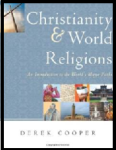
Christianity and the World Religions: An Introduction to the World’s Major Faiths
By Derek CooperCooper. Examines the rival worldviews found in Hinduism, Buddhism, Confucianism and Taoism, Judaism, Islam, and irreligion. He engages these worldviews from a Christian perspective.
See more study materials: www.KennethGentry.com
Sudan
A number of reports suggest that increasing numbers of Christ-followers are emerging in the brutal, war-torn nation of Sudan. Here, in the Nile River Valley—along the Islamic strongholds of Northern Africa—it is being noted that:
“One million Sudanese have turned to Christ since the year 2000—not in spite of persecution, war and genocide, but because of them … the estimated total number of Believers in the country is more than 5.5 million.”
Many are convinced that the great brutalities that this nation has encountered are becoming a catalyst for the expansion and growth of Christianity. Rather than inhibiting the Church, the war is actually propelling it.
Pakistan
Pakistan is typically not identified as a nation experiencing a move of God, but apparently they’re beginning to see one spark within their contentious borders. Christianity’s Middle-Eastern expansion is particularly evident in this unexpected place. Rosenberg acknowledges that:
“Senior Pakistani Christian leaders tell me there is a ‘conversion explosion’ going on in their country. There are now an estimated 2.5 million to 3 million born-again Pakistani Believers worshiping Jesus Christ. Whole towns and villages along the Afghan-Pakistani border are… converting to Christianity.”
This Islamic country is not alone, many others in this region are having similar things take place.
Egypt
Reliable reports suggest that there is also a great revival erupting in the land of Egypt. Rosenberg declares that, “Ministry leaders in Egypt estimate there are more than 2.5 million followers of Jesus Christ in their country. Many of these are Muslim converts.”
Undoubtedly, the severe persecutions and disruptions related to the “Arab Spring” have affected the lives of Christians throughout this nation, but the faithful have remained strong. Martyrdom invites outsiders to examine the claims of those willing to die for Jesus. It is believed that many amazing things are taking place in Egypt.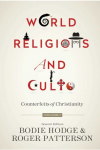
World Religions and Cults (Bodie Hodge, ed.)
This work is helpful for understanding and combating false religions and cults. It deals with the leading false religious beliefs in the world today.
See more study materials at: www.KennethGentry.com
Iran
Surprisingly, the contentious nation of Iran is also beginning to encounter the rising flames of awakening. Violent Islamic Fundamentalism has not been able to impede the advancement of the Gospel in this fierce Persian nation.
To continue reading rest of story, click: http://www.breakingchristiannews.com/articles/display_art.html?ID=17120
Click on the following images for more information on these studies:











Kenneth L. Gentry Jr.'s Blog
- Kenneth L. Gentry Jr.'s profile
- 85 followers



